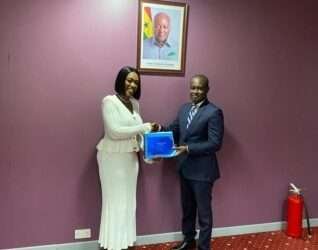A great majority of Ghanaian firms believe that the African Continental Free Trade Area (AfCFTA) holds huge prospects of transforming their businesses.
According to the second round of the COVID-19 Business Tracker Survey (BTS) conducted by the Ghana Statistical Service (GSS), three-quarters of Ghanaian firms, representing 76 percent believe that AfCFTA can help transform their businesses.
The optimism was however higher for large firms as 95 percent of such firms believe the implementation of AfCFTA will contribute significantly to improving their businesses.
Due to its significance to the success of businesses, the second round of the survey asked businesses about their knowledge and perspectives of the AfCFTA.
However, the survey reveals that most of the firms interviewed before the implementation of the AfCFTA were not aware of the trade area. It is surprising to know that only a quarter of firms, representing 26.2 percent report that they are aware, and that was after receiving an explanation.
The GSS further uncovered that large firms see more benefits from the AfCFTA than smaller firms and are also more aware.
There were big differences between small and large firms with regards to the kind of support that would be the most useful in making their firms to sell goods and services across the continent.
Small firms pointed to reduced cost of credit, increased information on business opportunities, and removing policy and regulatory bottlenecks.
Large firms, on the other hand, pointed to removing policy and regulatory bottlenecks, digitization, and business advisory services whilst the medium-size firms pointed to increased information on business opportunities, reduced cost of credit, and removal of policy and regulatory bottlenecks.
Trading under the agreement began on January 1, 2021, after it was postponed from taking off on July 1, last year because of the outbreak of the COVID-19 pandemic.
The AfCFTA aims to create the world’s largest free trade area with the potential that brings together more than 1.2 billion people with a GDP of over $2.5 trillion and usher in a new era of development. It has the potential to generate a range of benefits through economy of scale, trade creation, structural transformation, productive employment, and poverty reduction.
Generally, the findings of the survey indicate that there have been some improvements, but that Ghanaian businesses continue to be affected by the pandemic through a variety of channels and expect continuing impacts in the future.
“In the short run, policies that support firms in managing financial shocks will likely be beneficial, including increasing awareness of current schemes.
“In the longer term, policies that increase customer and business confidence; help reestablish broken supply channels, and assist firms adjusting to the new reality (e.g., by leveraging digital technologies) can be expected to help businesses recover from the shock”, the GSS said.
About the survey
The COVID-19 Business Tracker Survey (BTS) was conducted by the Ghana Statistical Service (GSS), in collaboration with UNDP and the World Bank, to better understand the impact of COVID-19 on the private sector.
The Tracker Survey aims at providing critical information to help the Government of Ghana, development partners, and other organizations monitor the effects of the pandemic on businesses.
The second-round of the BTS conducted between August 15 – September 10, 2020, re-interviewed firms from the first wave of the survey conducted between May 26 – June 17, 2020.
A total of 3,658 business establishments and household businesses were interviewed in the second round, lower than the original 4,311 firms sampled in the first round due to attrition.
The original sample in the first round was drawn from the 2013 Integrated Business Establishment Survey (IBES), the 2017 Ghana Living Standard Survey (GLSS), and supplemented with listings of SMEs provided by the National Board for Small Scale Industries (NBSSI) to ensure inclusion of recently established firms. The sample was also nationally representative.





















